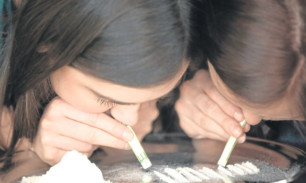
One in six teenage mums takes drugs including cocaine in the first few months of their baby’s life, a shock new survey has revealed.
More than half also said they smoked while expecting, with more than a third continuing their habit despite knowing they were pregnant.
The findings come from a Scottish Government survey of first-time mums.
It also revealed 10% of mums aged 19 and under drank alcohol while expecting, raising their child’s chances of suffering from foetal alcohol syndrome.
Experts and politicians are worried huge numbers of children are being introduced to drug taking from an early age, raising the risk of neglect and developing their own drug habits.
Dr Neil McKeganey, founding director of the Centre for Drug Misuse Research at the University of Glasgow, said: “Drug use during pregnancy can have serious adverse effects, including premature delivery and slower development.
“Mums who use drugs will have less awareness when meeting their children’s needs. Very young children require the utmost level of care and attention.
“Drug use can have an adverse effect on the environment they’re growing up in and lead to neglect.
“Many people regard cannabis as a recreational drug and less harmful than other drugs, but a child that sees its parents smoking cannabis will assume it’s a normal thing to do. It introduces them to drug taking and increases their own likelihood of using drugs.”
Previous estimates suggest one in every 264 newborns in Scotland suffers withdrawal symptoms as a result of junkie mums abusing deadly substances.
However, the Scottish Government survey which questioned the parents of 6,000 children born between March 2010 and February 2011 found 13% of first-time mums of all ages admitted taking illicit substances while pregnant or before their child turned one. The most commonly used drug was cannabis, followed by methadone, ecstasy and cocaine.
The figures were higher for teenage mums 18% of which took drugs, including cannabis and cocaine, before their baby turned one.
Cocaine use can restrict blood flow and oxygen to the foetus, increasing the risk of miscarriage, reduced brain growth and the underdevelopment of organs or limbs.
Research also suggests smoking cannabis during pregnancy can affect babies’ brain development.
Sheila Duffy, of anti-smoking group ASH Scotland, said tobacco use is also harmful and said more help is needed to get mums-to-be to quit.
She said: “Smoking has been linked to low birth weight, diabetes, asthma and attention deficit disorder in children, as well as miscarriage, premature birth, stillbirth and cot death.”
Scottish Conservative health spokesman Jackson Carlaw said: “This is a distressing statistic which points to a range of problems. Taking drugs during the early months and years of a child’s life is extraordinarily damaging and irresponsible.
“Clearly we need to do more to stop young pregnant women falling into this dangerous and reckless trap.”
The survey comes after leading doctors warned up to 7,000 babies a year in Britain are born damaged because their mothers drank alcohol during pregnancy.
Paediatricians and psychiatrists estimate that up to 1% of babies suffer damage such as learning disabilities as a result of being exposed to alcohol in the womb.
The Sunday Post asked the Scottish Government what it was doing to tackle drug use, smoking and alcohol consumption among young mums.
In response, public health minister Michael Matheson said it was “important to have measures in place to break the cycle of poverty and ensure that children growing up in Scotland have the best possible start in life”.

Enjoy the convenience of having The Sunday Post delivered as a digital ePaper straight to your smartphone, tablet or computer.
Subscribe for only £5.49 a month and enjoy all the benefits of the printed paper as a digital replica.
Subscribe